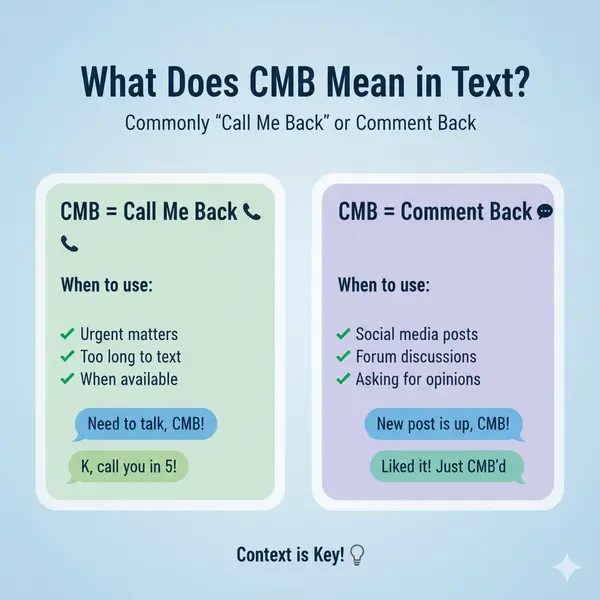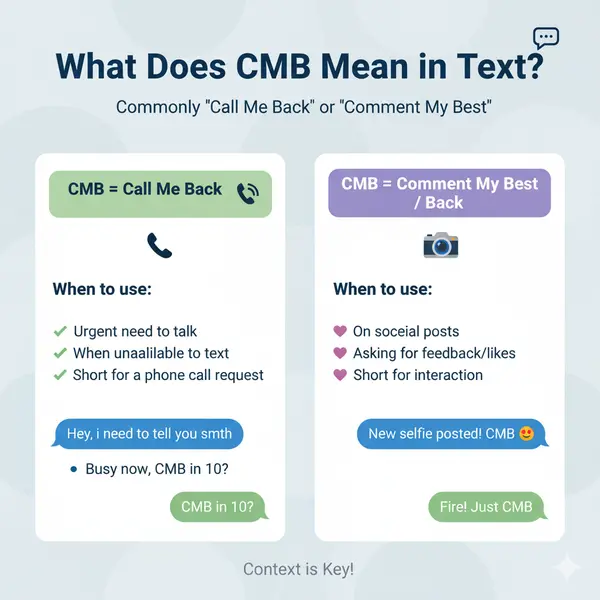CMB meaning in text — yes, that exact phrase — popped up on my screen one random afternoon, and I froze. CMB meaning in text wasn’t something I had ever seen before. CMB meaning in text looked like a typo, some secret code, or maybe a group chat shortcut I wasn’t invited to. Honestly, CMB meaning in text had me staring at my phone like, “Okay… what did I miss?”
If you’ve ever felt the same confusion, don’t worry — you’re about to understand it in seconds.
Quick Answer: CMB means “Call Me Back.”
It’s a short, friendly, and casual way of asking someone to return your call or respond when they’re free.

What Does CMB Mean in Text?
CMB stands for “Call Me Back.”
People use it when they tried calling someone, didn’t reach them, and now want a callback — without typing the whole sentence.
It’s simple, quick, and often used when you’re in a hurry.
Example:
“Hey, I tried calling earlier. CMB when you’re free.”
In short: CMB = Call Me Back = Return my call when you can.
Where Is CMB Commonly Used?
CMB is popular across places where people want short, fast communication:
- 📱 Regular texting (SMS)
- ✨ Snapchat
- 📘 Facebook Messenger
- 🎮 Gaming chats
- 📲 Quick replies during busy moments
Tone:
It is casual, friendly, and informal — perfect for friends, family, and quick chats, but not great for formal work messages.
Examples of CMB in Conversation
Here are realistic chat-style examples showing how people use it:
1.
A: “I missed your call. What’s up?”
B: “Nothing urgent, just CMB ❤️”
2.
A: “Bro you called?”
B: “Yeah man, CMB when you’re free.”
3.
A: “Did you want something?”
B: “Yep, CMB asap 😅”
4.
A: “In class rn 🤳”
B: “Cool, CMB after!”
5.
A: “You rang?”
B: “Yep, CMB pls.”
6.
A: “I’m driving.”
B: “Okay no rush, just CMB later 👍”
7.
A: “Was it important?”
B: “Not really, just CMB.”
When to Use and When Not to Use CMB
✅ Use CMB When:
- You want someone to return your call casually.
- You’re in a hurry and need a quick message.
- You’re texting friends or family.
- You want to keep things short and simple.
- You’ve missed the person and want a response when they’re free.
❌ Do NOT Use CMB When:
- Messaging a boss, teacher, or professional contact.
- Writing formal emails.
- Discussing serious or sensitive topics.
- When you want to sound polite and complete.
- When clarity is important and abbreviations may confuse someone.
Comparison Table
| Context | Example Phrase | Why It Works |
|---|---|---|
| Friend Chat | “No rush, CMB 😄” | Casual, friendly, easy to understand |
| Work Chat | “Please call me when you’re free.” | Professional + polite |
| “Kindly return my call at your convenience.” | Clear & formal |
Similar Slang Words or Alternatives
| Slang | Meaning | When to Use |
|---|---|---|
| BRB | Be Right Back | When stepping away for a moment. |
| TTYL | Talk To You Later | Ending a chat casually. |
| TTYS | Talk To You Soon | Friendly, ongoing conversations. |
| HMU | Hit Me Up | When you want someone to contact you. |
| LMK | Let Me Know | When waiting for information. |
| ASAP | As Soon As Possible | When it’s urgent or time-sensitive. |
FAQs About CMB
Is CMB flirty?
Not usually. It’s more practical than flirty. But it can feel warm depending on tone or emojis used.
Is CMB rude?
No — it’s casual, quick, and common. But in professional settings, it can seem too short.
Is CMB better than “Call me”?
CMB is shorter and more modern.
“Call me” sounds more direct and sometimes serious.
Can I use CMB with elders?
Only if they are familiar with texting slang. Otherwise, use full sentences.
What is the difference between CMB and HMU?
- CMB = return my call.
- HMU = contact me in any way (call, text, DM, etc.).
Conclusion
CMB is one of those quick, practical abbreviations you’ll see over and over once you know it. It keeps conversations fast, simple, and efficient — especially when you’re busy. Just remember: it’s perfect for friends and casual chats, but avoid it in formal communication.
Now that you know exactly what CMB meaning in text is and how to use it confidently, you won’t ever get confused when it pops up in a message again.
I’m a dreamer at heart, drawn to the quiet magic of wishing and the power of hope. As a child, I made wishes on dandelions and breezes, trusting they’d carry my dreams. That wonder led me to study creative writing and turn hope into heartfelt words. Now, I craft stories and messages to help others find light in life’s little moments —and when I’m not writing, I’m journaling under the stars or collecting tiny symbols of luck.









